|
AROUND THIS TIME every year, Archie Manning places a call to former New York Giants general manager Ernie Accorsi, who is retired and often watching baseball or immersed in a book. It's sort of a thank you, and Eli Manning will text, too, as thoughts drift back to 2004 and an afternoon at the NFL draft that became prime-time viewing: the day Eli Manning's camp forced a draft-day trade. The trajectories of three highly touted quarterbacks were put into motion that day by a baby-faced 23-year-old with deep NFL bloodlines. Eli Manning, son of Archie and brother of Peyton, was the presumptive No. 1 pick of the 2004 draft. The San Diego Chargers owned the No. 1 selection, and Eli didn't want to go there. His camp informed the Chargers of his stance a week and a half before the draft, and of course the news leaked. In the waning moments before the start of the draft, ESPN analysts debated whether Manning had the right to buck the system while Manning's family waited at a white-clothed table in the green room. Manning had been a known commodity for years, but Accorsi developed a deep admiration watching Eli rally his overmatched Ole Miss team in a loss to Auburn his junior year. The Giants, however, didn't pick until No. 4 in 2004. Accorsi had heard, as early as the NFL meetings that spring, that Manning did not want to go to San Diego. He carefully let the Chargers know they'd be interested if San Diego was amenable, and not much happened after that. The Chargers picked Eli anyway. When then-commissioner Paul Tagliabue called his name, Manning's audacity was booed from New York City to Balboa Park. He held up a Chargers jersey -- but didn't put on the hat -- and awkwardly posed for photos with Archie and his mom, Olivia. The crowd chanted "Eli sucks." Less than an hour later, the Giants rescued him, trading their No. 4 selection, quarterback Philip Rivers, and three other draft picks to San Diego for Manning. 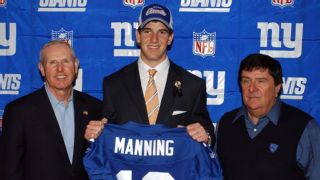 Twenty years later, the idea of a player dictating his own path is still taboo enough that Archie Manning, in a phone conversation earlier this month, wanted to make it clear that he did not orchestrate anything. "Everybody just assumed that," Archie says. "I think because I had played, they thought I had ramrodded that thing. I really didn't. If I had, I would've admitted it. That's not the kind of father I was, to go and spearhead a movement like that. "I can remember the first time Eli brought [the idea] up to me. I said, 'That sounds mighty bold to me.'" With the 2024 NFL draft set for April 25 to 27 in Detroit, the Mannings' story has taken on fresh relevance with new context. The Chicago Bears are expected to draft Caleb Williams, a highly touted quarterback out of USC, with the first overall pick. But over the winter, there were whispers that he might not want to go there. Those seem to have quelled, with Williams telling ESPN's Pete Thamel that he would be "excited" if he was drafted by the Bears. Chicago also has loaded up its offense in free agency, trading for receiver Keenan Allen and signing D'Andre Swift. This past fall, in the only interview his father Carl Williams has granted, he told GQ that going No. 1 is "the gift and the curse" because the best player often winds up on the worst team. "The funky thing about the NFL draft process is, he'd almost be better off not being drafted than being drafted first," the elder Williams told GQ. "The system is completely backwards." Archie Manning has served as a sounding board for other dads, such as Oliver Luck and Jimmy Burrow, whose quarterback sons were presumptive top picks, and says he has talked with Carl Williams a few times before by phone, mainly about the Manning Passing Academy. One time, according to Archie, Carl mentioned that someday, Manning might have to help him on which teams the family "may not want to go to. "And I said, 'Mr. Williams, that's not what I do.'" It all worked out for those uncomfortable young quarterbacks from 2004. Rivers went on to have a successful career with the Chargers, and quarterback Ben Roethlisberger, who New York was going to pick at No. 4 had San Diego not agreed to the trade, won two Super Bowls with the Pittsburgh Steelers. Manning is synonymous with New York, winning two Super Bowl rings. All three of them are likely to be in the Hall of Fame some day. Which raises the question: In this era of athlete empowerment, why don't more NFL prospects attempt to dictate where they go -- or don't go? 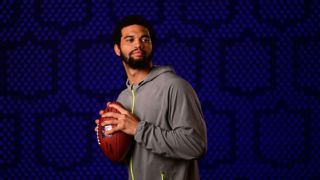 IN THE PAST four decades, just three No. 1 draft picks have publicly forged their own paths. All of them carried leverage. John Elway and Bo Jackson had baseball; Manning, it could be said, had the power of coming from football royalty. But the landscape for today's draftees has shifted with name, image and likeness (NIL) deals, social media, the explosion of entities that cover the league, and the NFL's collective bargaining agreement (CBA). Those forces are prompting college athletes to rethink their futures as they weigh the changes that add leverage but also present limitations. The advent of NIL is the most recent leverage, and it appears to have had an impact on the draft pool. In 2021, just a few months before NIL launched, 130 underclassmen declared for the NFL draft. This year, that number is 58. NFL agent Eugene Lee, whose 3 Strand Sports and Entertainment agency also navigates college players through NIL and the transfer portal, says today's college stars are highly aware of the influence they have on the NFL's ecosystem. "Not just on the field but off the field," Lee says. "They are the end product. Do they need to play to get paid? Yes. But for a lot of these athletes with peripheral streams based on some of these different channels ... They can jump-start their income due to NIL, and you're seeing more and more athletes willing to take a stand and realize their power at the end of the day." Just last month, Colorado coach Deion Sanders raised the stakes, saying his son, quarterback Shedeur Sanders, and two-way star cornerback/wide receiver Travis Hunter eventually will decide where they go in next year's NFL draft -- not the other way around. "I know where I want them to go," Deion Sanders said on the "Million Dollaz Worth of Game" podcast. "So, it's certain cities that ain't going to happen. It's going to be an Eli." As the days creep closer to the NFL draft, Carl Williams isn't saying much of anything. Both he and Bears general manager Ryan Poles declined to comment for this story. Last month, at USC's pro day, Carl Williams tried his best to fly under the radar. Poles came over to shake his hand, and the elder Williams leaned over and they chatted for a few minutes. Bears coach Matt Eberflus came over to chat, too. Then Caleb Williams prepared to start his throwing routine, and Carl moved to another side of the stands, alone. The Bears traded their starting quarterback, Justin Fields, to Pittsburgh last month, which seemingly signaled that they'd take Williams No. 1. That's the only thing that makes sense. Williams, who The Athletic recently reported earned around $10 million in NIL and endorsements in his final two seasons at USC, is considered a generational talent. But players, agents and decision-makers know one thing: Anything can happen on draft day. 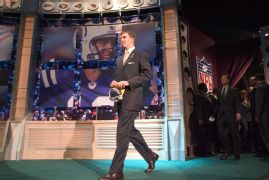 THE 2011 CBA, drafted after the NFL lockout, is known for boosting league parity and providing better compensation for veterans. But it also implemented the rookie wage scale. First-round picks would be locked into four-year deals, with a club option for a fifth year. With franchise tags, that player could be locked into a city, and a situation, until he's 30. Thirty, in the NFL, is generally considered the back end of careers for players who aren't quarterbacks. Marvin Demoff, who represented Elway, was struck by how owners were so insistent on team control in contracts. Demoff wonders if some of the 2011 CBA changes were prompted by owners who saw NBA players form superteams after LeBron James' "The Decision" in 2010. "They watched what goes on in basketball and said, 'We don't want to do that,'" he says. "Look, if Patrick Mahomes called Justin Jefferson and Ja'Marr Chase and said, 'We're going to play together, and no one will stop us,' that wouldn't go over well. And that can't happen in football." The idea of refusing to play for the team that drafted him actually was not something that John Elway or his father, Jack, conjured up. Demoff did. The 1983 draft is known as "The Draft of the Quarterbacks," with Elway, Jim Kelly, Dan Marino, Todd Blackledge, Tony Eason and Ken O'Brien all going in the first round. Demoff represented four of them. He met with the Elways, who were staring down a future with a Baltimore Colts franchise run by Robert Irsay, a meddlesome owner who was known for verbally abusing his players. Irsay had denied rumors that he would move the Colts out of Baltimore, then relocated the team to Indianapolis in the dead of the night on March 28, 1984. "I remember telling the Elways that they didn't have to play for the Colts," Demoff says. "They said, 'What are you talking about?' I said, 'You know, when I got out of law school, I didn't get drafted by a law firm in Des Moines. I got to do what I wanted to do. Your situation is sort of made for you having a choice. And that's what baseball provides for you.' "And they said, 'Wow.' They were all into it." Elway and his father met with six teams that winter, and Demoff says all of the teams were interested in the quarterback. Then it became a matter of will. Demoff told Elway that if he was truly willing to play baseball, then he'd get to the football team he wanted. The Colts' general manager at the time was, interestingly enough, Accorsi. He believed the Elway camp was bluffing, and that John Elway would not play baseball because he was, at his core, a football player. Accorsi was willing to trade out of the pick. But he says other teams were trying to steal it, taking advantage of Accorsi's position as a younger GM. He did not want to go down in history as the guy who passed up John Elway unless the Colts received a haul of draft picks. Accorsi wanted three No. 1 picks as a trade, and teams were going over his head to deal directly with Irsay. On April 26, 1983, the Colts selected Elway, then everyone waited. A week later, Irsay steered a trade to the Broncos, getting offensive tackle Chris Hinton, the Broncos' first-round pick that year, plus their 1984 first-round selection, along with quarterback Mark Herrmann. Elway led Denver to two Super Bowl championships and retired as a Bronco. Demoff says athletes might have less interest in which team they go to today because with rookie slotting, it doesn't affect their contract. He also thinks their representation might not be as willing to think out of the box. "The big agencies now represent so much of the talent," Demoff says. "They're fine with the system and don't need to rock the boat or recreate Manning or Elway." 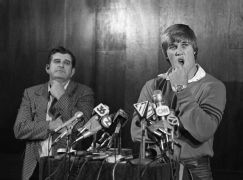 ELWAY HAD THE chutzpah to say he wanted to play on the West Coast or for Dallas or Miami. He faced backlash from veteran players, including Terry Bradshaw, who at the time was quarterback for the Pittsburgh Steelers. Bradshaw said Elway was "not the kind of guy you win championships with." Today's athletes face far more scrutiny. There's the wrath of social media, in which everyone, including the fan in the nosebleed seats or holed up in a basement, can spew their opinions anonymously. A well-regarded NFL marketing person who spoke on the condition of anonymity said social media hate has a significant impact on a young athlete's psyche, and that the next NFL player to publicly call his own shot in the draft will have to be a "special person who has a very long view of things. "People don't realize that Roger Goodell reading names on Thursday night, that gets bigger numbers than the NBA Finals and the World Series. This is a big deal. And you want to go against that? The pressure that comes with that. ... This is your first order of business at the company you're joining. There are responsibilities that come with being the No. 1 pick, being the person who's getting those salaries. It's not as easy as people make it out to be." The NFL machine is much bigger than it was 20 years ago, with millions more eyeballs. The Eli draft in 2004 was a two-day event that started on a Saturday afternoon and was broadcast by one network, ESPN. Now it launches on Thursday night, spans three days and is shown on the NFL Network, ABC and ESPN. Peter King, a recently retired longtime NFL reporter who covered four decades of drafts, says the scrutiny Caleb Williams would have received had he said he wasn't playing for Chicago would have become a "TMZ situation." "People would be chasing Caleb Williams all over wherever he is," King says. "Los Angeles, Washington -- the cameras would be catching him, they'd be taking pictures of him getting out of cars. He'd become the sporting version of what the paparazzi lives for." 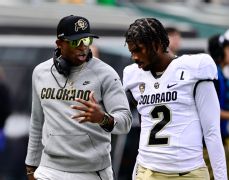 LIKE MOST DRAFT parents, Jimmy and Robin Burrow wanted the best for their son Joe, so they met with 14 agents who wanted to represent the LSU quarterback who would go No. 1 in the 2020 NFL draft. Some of the agents got straight to business. They floated scenarios of possible trades to steer him away from the Cincinnati Bengals, holders of that pick. The Bengals owned the No. 1 pick for good reason, starting the previous season 0-11 en route to a 2-14 record. If there is any quarterback who could handle the pressure and modern-day scrutiny of that, it might have been Burrow. The cigar-smoking, son-of-a-coach quarterback earned the nickname "Joe Cool" for his calm and easy demeanor. Burrow spoke out about athletes being compensated before NIL and was unafraid to take a stand against racial injustice. But the family, according to Jimmy, was not interested in Joe calling his shot. Joe Burrow grew up in Athens, Ohio, 2½ hours away from Cincinnati, and wanted to help the home team and enable his parents to easily watch his games. "The other thing that did intrigue him," Jimmy Burrow says, "which may be the opposite of some young guys coming out of the draft, is he saw the Bengals as a challenge. He wanted the Bengals to get to the point that they are now, pretty well respected." During the draft process, Jimmy leaned on Archie Manning as a resource, but Manning didn't try to steer them in any particular way. The same went for Oliver Luck, father of 2012 No. 1 pick Andrew Luck. The elder Manning is good enough friends with Oliver Luck that he calls him "Ollie." They were teammates in the early 1980s in Houston, with Luck serving as Manning's backup. Three decades later, Andrew Luck was tasked with replacing Peyton Manning in Indianapolis. Oliver Luck says the Eli move "made sense" with the Mannings' situation, but that he also thinks that a lot of players don't really care much about where they end up. "They want to go as high as possible," Oliver Luck says, "or at least go to a team in which there's a good chance for that individual to get playing time. I was happy as hell when the Oilers called my name up in 1982. "We never had any discussions at all [about draft-day trades] quite honestly. I haven't really given it much thought. I guess Caleb's dad said something a while back. ... In a sense, nothing is surprising anymore. ... Listen, the system is the system. The draft is obviously the best system that professional sports have to keep a level of parity. The NFL is an incredibly well-run league. Virtually all the decisions they make are right ones for the business and the game on the field. And I think players respect that, too." But not every player in the past few decades has been in lockstep with their prospective teams. Agent Leigh Steinberg, who represented Roethlisberger in 2004 and sat through those agonizing hours until his client was picked 11th, says that pre-draft maneuverings do take place. "It happens much more than you would know," Steinberg says. "Because all the public sees is the ultimate result. But in a number of situations where trades have taken place, athletes have expressed discomfort with going to a certain site or told them they didn't want to. They have no legal right to resist, but that information goes through the pipeline. And the difference in Elway and Manning was that instead of behind the scenes, it played out publicly. "I'm not going to go into detail because I still have to represent players. But I would tell you that there's a lot of exploration going on behind the scenes so that teams avoid exactly what happened. ... I was backstage, watching it play out back in 2004. And it was extremely uncomfortable. Manning looked very unhappy. In general, teams would like to suss all that out." 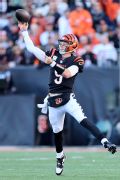 PETER KING VISITED the Oakland Raiders during the 2004 draft. He sat in owner Al Davis' office the day before the Raiders would make the second pick. Davis had four TVs in his office, situated in the shape of a diamond. He loved watching women's basketball on the televisions and told King he was particularly impressed with the play of Diana Taurasi. King was almost certain the Raiders would pick a quarterback. The Raiders were in flux at quarterback after Rich Gannon's season-ending injury, and in that draft rich with quarterback talent, King thought Davis might pick a franchise-altering signal-caller. The Raiders drafted offensive tackle Robert Gallery. King says that 2004 draft was the most interesting of his career. Larry Fitzgerald and Kellen Winslow were in that draft. Then there were the quarterbacks and the Eli drama. Late that night after the first day of the draft, King called Accorsi, who was watching a baseball game. "He was just as calm as anything," King says. Earlier that day, Accorsi was prepared to pick Roethlisberger. The Giants were on the clock at No. 4, and he told a young intern to write Roethlisberger's name on the draft card. Accorsi says he had spoken with Chargers GM A.J. Smith a couple of times before the draft, but their conversations went nowhere because San Diego wanted New York to include young Giants pass-rusher Osi Umenyiora in the deal. But that was a nonstarter for New York. Smith told Accorsi that he'd call him Friday, the day before the draft, Accorsi says. But that call never came, and Accorsi wasn't about to call San Diego. He figured that no matter what happened, Roethlisberger was a great backup option to Manning. Accorsi was in his office with team ownership when San Diego called roughly halfway through the Giants' time on the clock. Smith, according to Accorsi, asked for Umenyiora again, and Accorsi again said no. The Chargers settled for New York's No. 1 pick in 2005 and requested that New York pick Philip Rivers for the trade. With the clock winding down, a deal was made. Two decades after losing Elway, Accorsi landed his quarterback. 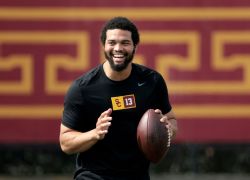 AFTER A RECENT April phone conversation with ESPN, Archie Manning called back, wanting to make a clarification. He said he never wanted to do anything to put the Chargers down during the 2004 draft process, and he still doesn't. That day in New York, he was put under the hot lights, too, with reporters asking a flurry of questions about why he didn't want his son to go to San Diego. The reasons were obvious -- the team's lack of success, quarterback Drew Brees had struggled that previous season in San Diego -- but to this day, Eli still hasn't given much of an answer on why he made such a bold decision 20 years ago. On draft night, with his father beside him, Eli told ESPN's Suzy Kolber: "We're not really giving details right now. We made our decision, and that's what we're sticking to." In 2013, when asked by New York reporters why he didn't want to play for San Diego, he replied, "I forgot." Three years ago, on a Kyle Brandt podcast, Manning said he made the decision after talking with his agent, coaches and front office people. "Going through the draft process," Eli told Brandt, "I was just worried about the Chargers organization at the time. I felt it was the right decision and I had a little pull." Manning declined an interview request for this story through a representative from Omaha Productions. After the Giants nabbed him that late-April day in 2004, they sent a car for the family and whisked them away to Giants Stadium in East Rutherford, New Jersey. When Eli arrived in the old lobby and walked across the threshold, it reminded Accorsi of the scene near the end of "Field of Dreams" when Burt Lancaster's character steps across the baseline. "Somebody said, 'Well, you're a Giant now,''' Accorsi said. "And he was -- they were -- happy. There was no question." Manning spent 16 years with the Giants and could have played longer, Archie says. But he didn't want to be anywhere except in New York with the Giants. "I'm glad that Eli had a career that people, maybe especially Giants fans, remember more than [the draft]," Archie says. "He sure did love playing there." ESPN senior writer Seth Wickersham contributed to this report.
|
